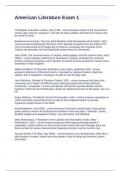American Literature Exam 1
Christopher Columbus, Letters, circa 1493. correct answers writes of the new land he
comes upon, how he conquers it, and why he feels justified, describes the natives and
the lands he finds.
Bartolomé de la Casas, The Very Brief Relation of the Devastation of the Indies, 1552.
correct answers Represents the horror of the Spanish Conquest from the Indian POV,
story of enslavement at the beginning of America, recognizes the humanity of the
Indians and describes how the Spaniards treated them so inhumanely
John Smith, The General History of Virginia, New England, and the Summer Isles, early
1600s. correct answers settlement of Jamestown, Virginia, motivated by economic
promise (Virginia Company), each member of society must be productive. Names many
landmarks in New England.
William Bradford, Of Plymouth Plantation, early 1600s, published 1856. correct
answers settlement of Plymouth county, motivated by religious freedom (hardcore
pilgrim), full of metaphors, importance of faith in God through trials
John Winthrop, A Model of Christian Charity, 1630. correct answers talks about the
community as a "body"--all different parts, laws governing God strictly enforced.
Conformity = cooperate = survive and please God (stick to puritan ideals), tension
between conformity and individuality, always be afraid (instrument of the state), city on a
hill
Roger Williams, The Bloody Tenet of Persecution, 1644. correct answers separation of
church and state, government has no right to force religious beliefs on people,
organized, largely based on the Bible
Anne Bradstreet, mid 1600s. correct answers first known colonial poet, loyal puritan,
poetry reflects concern for husband and children in this new place, "domestic" poetry,
detailed images and metaphors (birds), very self-aware, self-reflection
Mary Rowlandson, A Narrative of the Captivity and Restoration of Mrs. Mary
Rowlandson, 1682. correct answers exposes what happens through period of
captivation, shows reliance on God, knows God's mercy will come through, does not
focus on hate for natives (admires their ingenuity at times), but her love for God
Samuel Sewall, The Diary, late 1600s. correct answers very detailed diary, feels like a
play-by-play of events, shows how close death is (lots of dying and funerals), salem
witch trials
, Sarah Kemble Knight, The Private Journal of a Journey from Boston to New York,
correct answers travel log, novelty of a woman traveling, casts herself as "larger than
life character," ambitious and capable woman, depiction of women is different from
previous writers because she is very confident and opinionated, lots of observations of
the people she encounters
Jonathan Edwards, Personal Narrative, 1740. correct answers discusses his very
strong views that have been formed/affirmed over time, wants nothing more than to be
in/for Christ, God's grace is the only way to be saved, importance of salvation, the fact
that people are innately evil is Puritan
Jonathan Edwards, Sinners in the Hands of an Angry God, 1741. correct answers
wants to transform mere believers to converted Christians who were genuinely MOVED
by their beliefs, sense of urgency and persuasion, brutal language, very direct, leaders
readers to the answer he wants with carefully framed questions
Benjamin Franklin, The Way to Wealth, 1758. correct answers collection of advice from
poor richard's almanac
Benjamin Franklin, The Autobiography, 1791. correct answers optimistic text about how
you can write your own story, values simplicity and hard work, focus on personal effort
(not on God's grace) to attain success, clear and intense style
John and Abigail Adams, Letters, written circa 1776, published in 1875. correct
answers revolutionary because the couple sees each other as equals, very intimate, he
trusted her completely, we can learn a lot of the founding of our country
Thomas Jefferson, The Declaration of Independence, 1776. correct answers our
country's founding document, "all men are created equal"
Olaudah Equiano, The Interesting Narrative of the Life of Olaudah Equiano, 1789.
correct answers slave narrative, considers himself lucky compared to the others, uses
Christian logic well, criticizes the behavior of the white man but not the people
themselves, humanizes africans
J. Hector St. John de Crevecoeur, Letters from an American Farmer, 1782. correct
answers Americans come from a lot of different backgrounds, like a melting pot,
religious indifference, upward mobility possibility (american dream), very against slavery
Phillis Wheatley, late 1700s. correct answers very talented poet, impressive as she was
a woman and african american, uses sarcasm/irony to use Christian logic against them
Mayflower Compact correct answers An agreement reached by the Pilgrims on the
Mayflower in 1620, just before they landed at Plymouth Rock. The Mayflower Compact
bound them to live in a civil society according to their own laws: accept majority rule,




